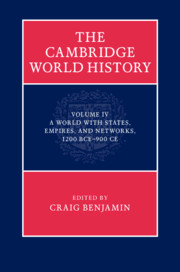Book contents
- The Cambridge World HistoryVolume IV
- The Cambridge World History
- A World with States, Empires, and Networks, 1200 bce–900 ce
- Copyright page
- Contents
- Figures
- Maps
- Tables
- Contributors
- Preface
- 1 Introduction: the world from 1200 bce to 900 ce
- Part I Global histories
- Part II Trans-regional and regional perspectives
- 10 Western and Central Eurasia
- 11 Regional study: Baktria – the crossroads of ancient Eurasia
- 12 The Mediterranean
- 13 Regional study: Athens in the fifth century bce
- 14 Late antiquity in Europe c. 300–900 ce
- 15 East Asia
- 16 Regional study: Confucianism and the state
- 17 Regional study: exchanges within the Silk Roads world system
- 18 South Asia
- 19 Regional study: Pataliputra
- 20 The Americas
- 21 Regional study: Chaco Canyon and the US Southwest
- 22 Australasia and the Pacific
- 23 Africa: states, empires, and connections
- 24 Regional study: trans-Saharan trade
- Index
- References
12 - The Mediterranean
from Part II - Trans-regional and regional perspectives
Published online by Cambridge University Press: 05 May 2015
- The Cambridge World HistoryVolume IV
- The Cambridge World History
- A World with States, Empires, and Networks, 1200 bce–900 ce
- Copyright page
- Contents
- Figures
- Maps
- Tables
- Contributors
- Preface
- 1 Introduction: the world from 1200 bce to 900 ce
- Part I Global histories
- Part II Trans-regional and regional perspectives
- 10 Western and Central Eurasia
- 11 Regional study: Baktria – the crossroads of ancient Eurasia
- 12 The Mediterranean
- 13 Regional study: Athens in the fifth century bce
- 14 Late antiquity in Europe c. 300–900 ce
- 15 East Asia
- 16 Regional study: Confucianism and the state
- 17 Regional study: exchanges within the Silk Roads world system
- 18 South Asia
- 19 Regional study: Pataliputra
- 20 The Americas
- 21 Regional study: Chaco Canyon and the US Southwest
- 22 Australasia and the Pacific
- 23 Africa: states, empires, and connections
- 24 Regional study: trans-Saharan trade
- Index
- References
Summary
Keywords
- Type
- Chapter
- Information
- The Cambridge World History , pp. 325 - 349Publisher: Cambridge University PressPrint publication year: 2015

